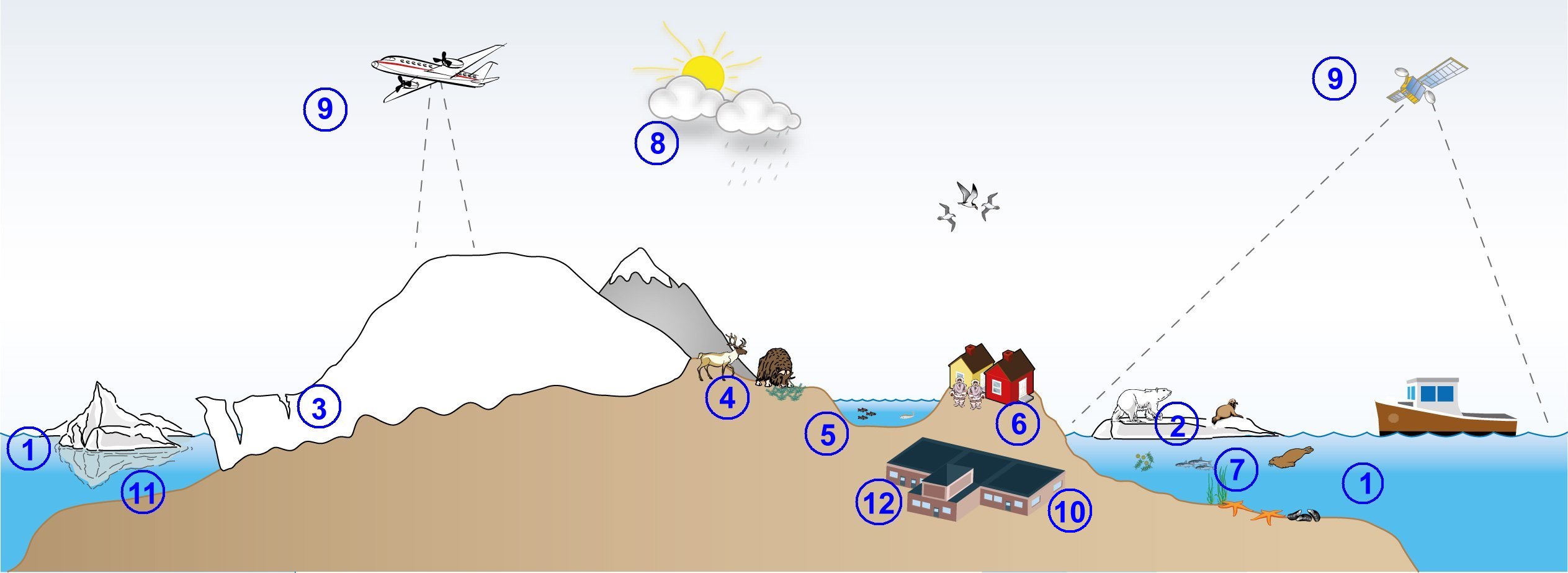Research Themes
Research Themes
1. Ocean & Fjord systems
Changing climatic conditions will have considerable effects on the seas around the Arctic. Melting glaciers, the formation of sea ice, large scale circulation of the Atlantic Ocean as well as more local changes in weather patterns will have direct impact, with cascading effects to biological processes and sustainable harvesting of marine resources. Several research projects are running within the partnership context.
2. Sea ice
The Arctic climate and the seas around the Arctic are currently changing at dramatic rates. Increasing temperatures, changes in precipitation, melting glaciers and reduction in sea-ice cover changes the productivity and the distribution of the biological resources in the sea.
3. Ice sheet and glaciers
The Greenland Ice Sheet and other Arctic ice sheet reacts on the warming that the Arctic has been subject to the last 10 years. The melt has increased and the glacier fronts have retreated. The melt has both global and local impact. There are big gaps in our knowledge on the amount of freshwater produced each year and on how and where the water melts.
4. Terrestrial ecosystems
The terrestrial ecosystems will continually be studied through monitoring and by using the existing data on land-based ecosystems, with the objective of answering how the expected changes in the climate will affect these systems.
5. Limnic ecosystems
The limnic ecosystems will continually be studied through monitoring and by using the existing data on these land-based ecosystems, with the objective of answering how the expected changes in the climate will affect these systems.
6. Community & Traditional Knowledge
A new ‘Climate and Society’ research group began its work on 1st February 2012. It links Ilisimatusarfik/University of Greenland and the Greenland Climate Research Centre in Nuuk and strengthens international collaboration with the University of Alberta in Edmonton, Canada.
7. Marine ecosystems
Through interdisciplinary and closely coordinated projects it is the aim to understand how the marine ecosystems are affected, and continually will be affected by the changes that the change in the climate is bringing.
8. Weather, climate and atmosphere
The study of the weather, climate and atmospheric systems will be conducted through several cooperative projects.
9. Surveillance
Greenland Ecosystem Monitoring (GEM) is an intensive cross-disciplinary baseline study of climate change effects on marine and terrestrial ecosystems at two sites in Greenland, i.e. at Zackenberg in the high arctic Northeast Greenland and at Nuuk in the low arctic West Greenland.
10. Data/models
Changing climatic conditions will have considerable effects on e.g. the seas in the Arctic. Melting glaciers, the formation of sea ice, large scale circulation of the Atlantic Ocean as well as more local changes in weather patterns will have direct impact, with cascading effects to biological processes and sustainable harvesting of marine resources. This enforces the development of new data collections and new climate modeling.
11. Seabed history
To throw light on longer term ocean-ice stream processes and sedimentation patterns by looking into the seabed history.
12. Governance
Climate change and globalization dramatically affect the Arctic region. New economic opportunities in shipping, extractive industries, or fisheries impact the environment, the economic, social and cultural basis of small-scale Arctic societies, as well as international relations. There are many gaps and discrepancies in the regulatory framework as well as in the decision-making and implementation processes. Research is needed to increase the efficiency and legitimacy of Arctic governance.






